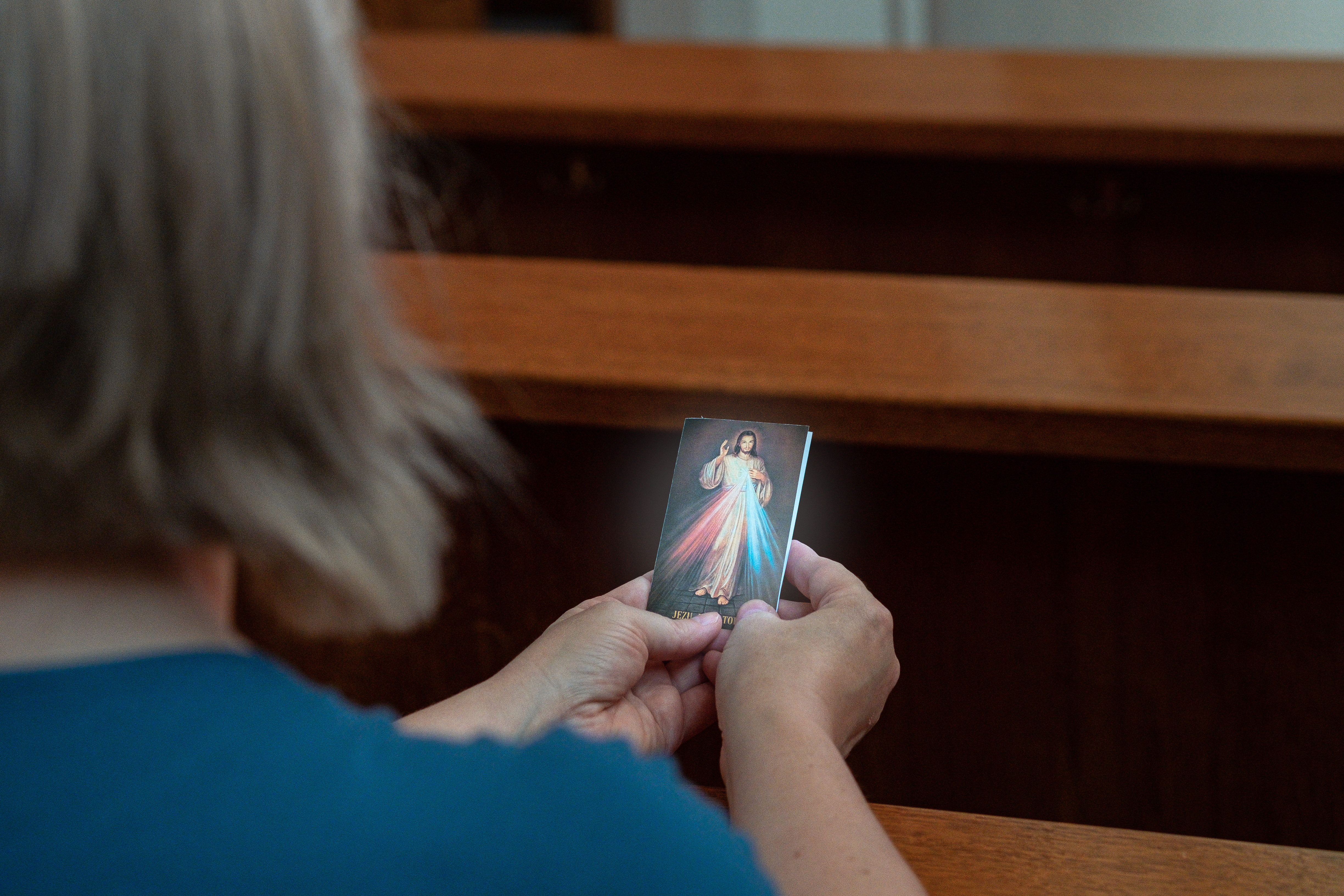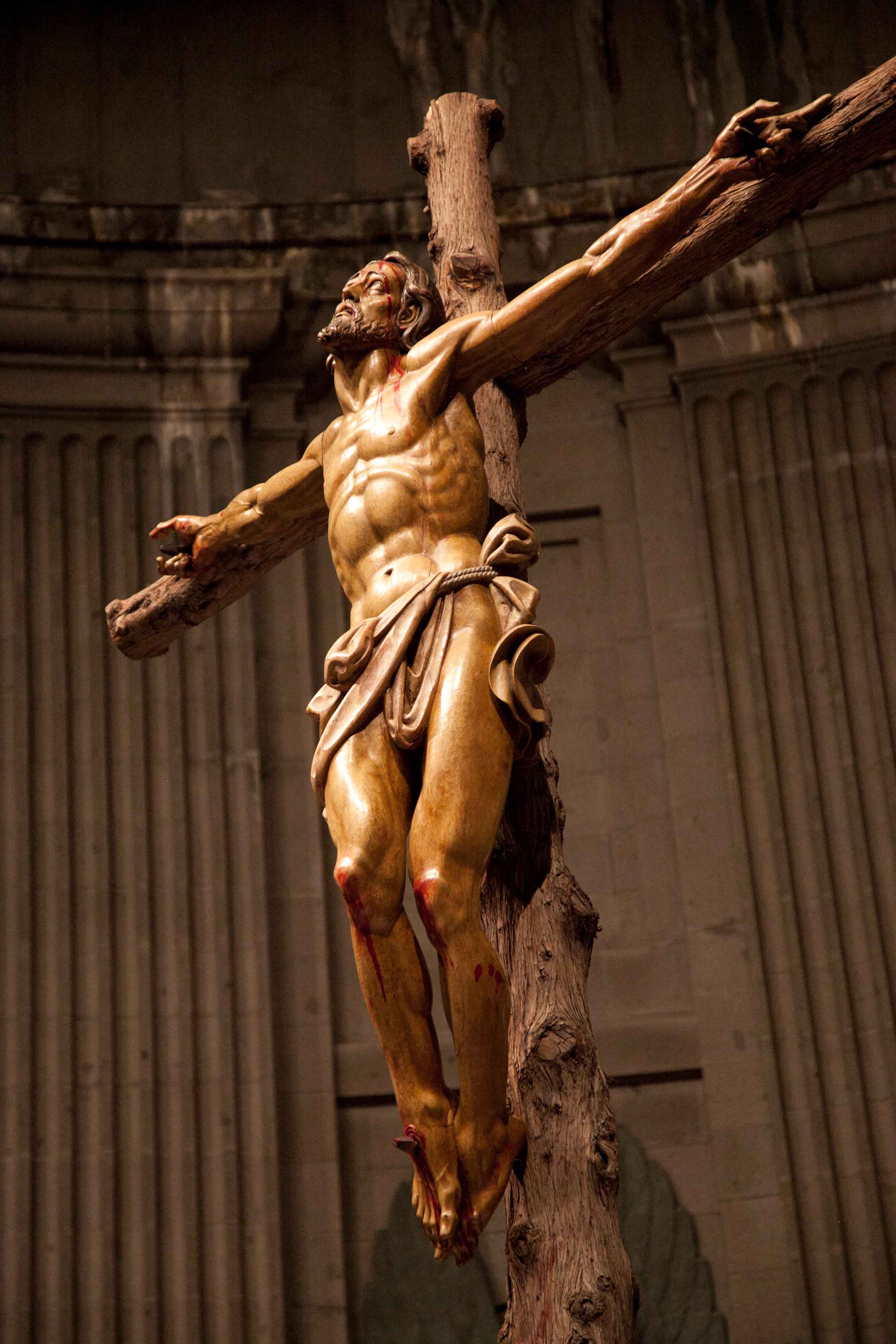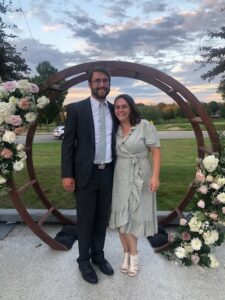Imagine you are an ancient king, responsible for a vast area and the lives of many people. Neighboring kings have joined forces and are destroying nearby kingdoms, and now send the message that you are next. What would you do? Would you panic? Would you begin scrambling for a solution?
This is the situation in today’s first reading from 2 Kings. And Hezekiah, king of Judah, did none of those things. When he received a message from the king of Assyria, who was threatening doom, Hezekiah immediately went into the temple of the Lord and put all his hope in the God of Israel. He first praised God as the One above all others and then he humbly asked God to save the kingdom of Judah from the power of the Assyrians – not for their own sake, but “that all the kingdoms of the earth may know that you alone, O Lord, are God.” God, faithful to his promises in every generation, struck down 185,000 soldiers and sent them packing back to Nineveh. Hezekiah won by putting all his trust in the Lord.
This brings us indirectly to the Gospel for today. Jesus is very clear about something that we can be a little foggy about: “the gate is wide and the road broad that leads to destruction, and those who enter through it are many.” When I read that, I am shaken by the truth that many are following the way to destruction. I want to believe that most people are good and generous most of the time, but the Lord’s words tell a different story. “How narrow the gate and constricted the road that leads to life. And those who find it are few.” How can this be?
It’s simple, really. The narrow gate and constricted road are not the way of niceness, or the way that our culture sees as “successful.” We must look beyond the surface to see that it is the way of complete trust in the Lord, rather than self-reliance, no matter how “successful” that makes us. It is the radical trust that goes to prayer before mustering an army, that trusts in the Lord to fight our social and emotional battles rather than insisting on fixing everything ourselves, that entrusts all the people we love and all their situations to the goodness of God.
This does not come easily to our fallen human nature, and it is certainly not “the way of the world.” But, like Hezekiah, let us truly put all our trust in the Lord. Let us each ask God to show us the ways we insist on taking care of things ourselves, and to give us the grace to entrust each of these things completely to him, so that we at last truly trust in him and are set free to do His will rather than our own.
Imagina que eres un rey de la edad antigua, responsable de un área inmensa y de la vida de muchas personas. Los reyes vecinos han unido fuerzas y están destruyendo reinos cercanos, y ahora envían el mensaje de que tú eres el próximo. ¿Qué harías? ¿Entrarías en pánico? ¿Comenzarías a buscar una solución?
Ésta es la situación en la primera lectura de hoy de 2 Reyes. Y nada de eso hizo Ezequías, rey de Judá. Cuando Ezequías recibió un mensaje del rey de Asiria que lo amenazaba con su destrucción, entró inmediatamente en el templo del Señor y puso toda su esperanza en el Dios de Israel. Primero alabó a Dios como el que está por encima de todos los demás y luego humildemente le pidió a Dios que salvara el reino de Judá del poder de los asirios, no por su propio bien, sino “para que sepan todas las naciones que sólo tú, Señor, eres Dios”. Dios, fiel a sus promesas en cada generación, derribó a 185.000 soldados y los envió de regreso a Nínive. Ezequías ganó poniendo toda su confianza en el Señor.
Esto nos lleva indirectamente al Evangelio de hoy. Jesús pone muy claro algo en lo que podemos estar un poco confusos: “ancha es la puerta y amplio el camino que conduce a la perdición, y son muchos los que entran por él”. Cuando leo eso, me estremece la verdad de que muchos están siguiendo el camino de la destrucción. Quiero creer que la mayoría de las personas son buenas y generosas la mayor parte del tiempo, pero las palabras del Señor cuentan una historia diferente. “¡qué estrecha es la puerta y qué angosto el camino que conduce a la vida, y qué pocos son los que lo encuentran!” ¿Cómo puede ser esto?
Es muy sencillo, de verdad. La puerta estrecha y el camino restringido no son el camino hacia la amabilidad, o el camino que nuestra cultura considera “exitoso”. Debemos mirar más allá de la superficie para ver que es el camino de la confianza total en el Señor, en lugar de la autosuficiencia, sin importar cuán “exitosos” nos haga. Es la confianza radical que acude a la oración antes de reunir un ejército, que confía en el Señor para pelear nuestras batallas sociales y emocionales en lugar de insistir en arreglar todo nosotros mismos, que confía a todas las personas que amamos y todas sus situaciones a la bondad de Dios.
Esto no es fácil para nuestra naturaleza humana caída, y ciertamente no es “el camino del mundo”. Pero, como Ezequías, pongamos realmente toda nuestra confianza en el Señor. Pidamos a Dios que nos muestre las formas en que insistimos en ocuparnos de las cosas nosotros mismos, y que nos dé la gracia de confiarle cada una de estas cosas por completo, para que finalmente podamos confiar verdaderamente en él y seamos libres para hacer Su voluntad en lugar de la nuestra.
 Kathryn Mulderink, MA, is married to Robert, Station Manager for Holy Family Radio. Together they have seven children (including Father Rob), and eight grandchildren. She is President of the local community of Secular Discalced Carmelites and has published five books and many articles. Over the last 30 years, she has worked as a teacher, headmistress, catechist, Pastoral Associate, and DRE, and as a writer and voice talent for Catholic Radio. Currently, she serves the Church by writing and speaking, and by collaborating with various parishes and to lead others to encounter Christ and engage their faith. Her website is www.KathrynTherese.com
Kathryn Mulderink, MA, is married to Robert, Station Manager for Holy Family Radio. Together they have seven children (including Father Rob), and eight grandchildren. She is President of the local community of Secular Discalced Carmelites and has published five books and many articles. Over the last 30 years, she has worked as a teacher, headmistress, catechist, Pastoral Associate, and DRE, and as a writer and voice talent for Catholic Radio. Currently, she serves the Church by writing and speaking, and by collaborating with various parishes and to lead others to encounter Christ and engage their faith. Her website is www.KathrynTherese.com
Feature Image Credit: Brett Jordan, unsplash.com/photos/brown-wooden-blocks-on-white-surface-CDoKLQeUHyk


 Deacon Dan Schneider is a retired general manager of industrial distributors. He and his wife Vicki have been married for over 50 years. They are the parents of eight children and thirty-one grandchildren. He has a degree in Family Life Education from Spring Arbor University. He was ordained a Permanent Deacon in 2002. He has a passion for working with engaged and married couples and his main ministry has been preparing couples for marriage.
Deacon Dan Schneider is a retired general manager of industrial distributors. He and his wife Vicki have been married for over 50 years. They are the parents of eight children and thirty-one grandchildren. He has a degree in Family Life Education from Spring Arbor University. He was ordained a Permanent Deacon in 2002. He has a passion for working with engaged and married couples and his main ministry has been preparing couples for marriage.
 Susan Ciancio has a BA in psychology and a BA in sociology from the University of Notre Dame, with an MA in liberal studies from Indiana University. For the past 19 years, she has worked as a professional editor and writer, editing both fiction and nonfiction books, magazine articles, blogs, educational lessons, professional materials and website content. Thirteen of those years have been in the pro-life sector. Currently Susan freelances and writes weekly for HLI, edits for American Life League, and is the executive editor of Celebrate Life Magazine. She also serves as executive editor for the Culture of Life Studies Program—an educational nonprofit program for K-12 students. You can reach her at
Susan Ciancio has a BA in psychology and a BA in sociology from the University of Notre Dame, with an MA in liberal studies from Indiana University. For the past 19 years, she has worked as a professional editor and writer, editing both fiction and nonfiction books, magazine articles, blogs, educational lessons, professional materials and website content. Thirteen of those years have been in the pro-life sector. Currently Susan freelances and writes weekly for HLI, edits for American Life League, and is the executive editor of Celebrate Life Magazine. She also serves as executive editor for the Culture of Life Studies Program—an educational nonprofit program for K-12 students. You can reach her at 

 Mike Karpus is a regular guy. He grew up in Michigan’s Upper Peninsula, graduated from Michigan State University and works as an editor. He is married to a Catholic school principal, raised two daughters who became Catholic school teachers at points in their careers, and now relishes his two grandchildren, including the older one who is fascinated with learning about his faith. He also has served on a Catholic school board, a pastoral council and a parish stewardship committee. He currently is a lector at Mass, a Knight of Columbus, Adult Faith Formation Committee member and a board member of the local Habitat for Humanity organization. But mostly he’s a regular guy.
Mike Karpus is a regular guy. He grew up in Michigan’s Upper Peninsula, graduated from Michigan State University and works as an editor. He is married to a Catholic school principal, raised two daughters who became Catholic school teachers at points in their careers, and now relishes his two grandchildren, including the older one who is fascinated with learning about his faith. He also has served on a Catholic school board, a pastoral council and a parish stewardship committee. He currently is a lector at Mass, a Knight of Columbus, Adult Faith Formation Committee member and a board member of the local Habitat for Humanity organization. But mostly he’s a regular guy.


 A lover of Jesus Christ, a wife, and a mother of five,
A lover of Jesus Christ, a wife, and a mother of five, 


 Heather Orlowski and her husband are busy parents of two little girls (ages 2 and 4). The Catholic Church holds a special place in her heart and in her entire life. She attended Catholic schools from Kindergarten through college. She graduated from Aquinas College with a degree in Elementary/Special Education. Catholic Education is very important to her and she now teaches 1st and 2nd grades at St. Therese Catholic School. In her free time, she loves creating memories with her family and watching her little girls play soccer.
Heather Orlowski and her husband are busy parents of two little girls (ages 2 and 4). The Catholic Church holds a special place in her heart and in her entire life. She attended Catholic schools from Kindergarten through college. She graduated from Aquinas College with a degree in Elementary/Special Education. Catholic Education is very important to her and she now teaches 1st and 2nd grades at St. Therese Catholic School. In her free time, she loves creating memories with her family and watching her little girls play soccer. 
 Dr. Alexis Dallara-Marsh is a board-certified neurologist who practices in Bergen County, NJ. She is a wife to her best friend, Akeem, and a mother of two little ones on Earth and two others in heaven above.
Dr. Alexis Dallara-Marsh is a board-certified neurologist who practices in Bergen County, NJ. She is a wife to her best friend, Akeem, and a mother of two little ones on Earth and two others in heaven above.


 Merridith Frediani loves words and is delighted by good sentences. She also loves Lake Michigan, dahlias, the first sip of hot coffee in the morning, millennials, and playing Sheepshead with her husband and three kids. She writes for Catholic Mom, Diocesan.com, and her local Catholic Herald. Her first book Draw Close to Jesus: A Woman’s Guide to Adoration is available at Our Sunday Visitor and Amazon. You can learn more at
Merridith Frediani loves words and is delighted by good sentences. She also loves Lake Michigan, dahlias, the first sip of hot coffee in the morning, millennials, and playing Sheepshead with her husband and three kids. She writes for Catholic Mom, Diocesan.com, and her local Catholic Herald. Her first book Draw Close to Jesus: A Woman’s Guide to Adoration is available at Our Sunday Visitor and Amazon. You can learn more at 